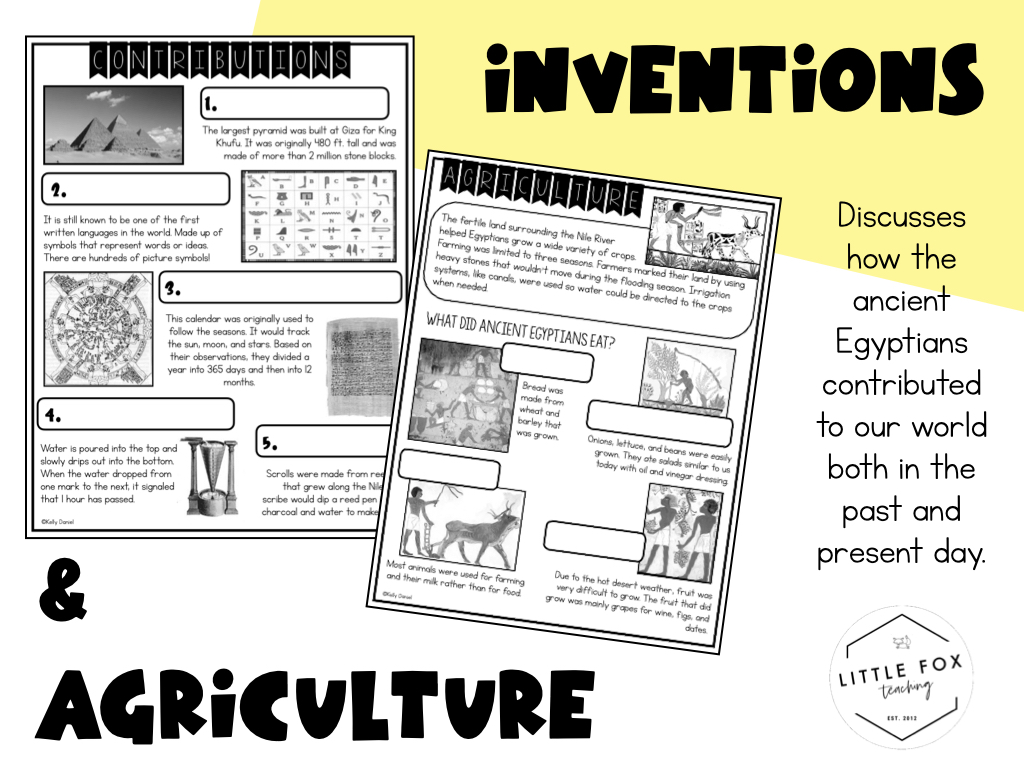When I taught second grade we had an entire Social Studies theme on ancient civilizations. We explored maps and developed map reading skills, geography (continents and oceans), climates, and the other obvious stuff like culture, religion, language, and contributions or inventions. Learning about ancient cultures are always a hit with my students and today I'm excited to share the newest workbook for students!
Ancient Egypt
As a kid I was obsessed with ancient Egypt - I even wanted to become an Egyptologist at one point. I found the entire civilization to be fascinating and couldn't learn enough about it. This workbook is inspired by that feeling and includes all the major topics. Let's take a peek!
To begin, I love incorporating Annie and Moby (i.e. BrainPop Jr) into my lessons to help break up the ways I teach or introduce different concepts. For this unit I mix things up with videos, lecture, hands on activities, and more - this ensures I keep my kids engaged and learning the whole unit!
See if your school has a subscription to BrainPop Jr because mine did when I taught 2nd grade and we used it for almost everything. They're age-appropriate videos that are great for introducing topics across subjects and for this unit I like to begin with the Ancient Egypt video.
I found this one that a teacher created for using during distance learning. It's a better quality than most, but having a subscription will definitely be best! You can also try grabbing a login and password via a simple Google search or see if you have any teacher colleagues who'd be willing to share their logins!
Map Skills
I always begin my ancient civilization units with an introduction of their geography and a review of map reading skills. Maps are a topic we learn more towards the beginning of the year, so when we learn about Egypt later in the year it's a familiar skill.
This workbook has three different pages for Egypt's geography: located on the continent of Africa, identify within Africa where the country is located, and label the seas/rivers and cities of note. Students use tools like word banks and keys to complete that section of notes.
Climate & Land
For this section, students learn about the climate and land of Egypt. For a civilization to survive and thrive like the ancient Egyptians did, it's important for students to understand that the Nile played a very important role. Students will learn that Egypt is mostly desert and the Nile provided fertile soil and water for crops. It also allowed for transportation and eventually trade.
In this workbook students practice their reading comprehension skills to pull details from the text to fill in the blanks of their notes. Teachers can reinforce skills using highlighters or circling the important details. The other page students complete the sentence and draw pictures to illustrate their understanding of Egypt's climate and usefulness of the Nile.
Inventions/Contributions
It's fascinating to learn that people who existed before the major inventions of our time contributed so much to our understanding of the world. The ancient Egyptians invented a number of things we use today and is considered a marvel in the area of science, math, and agriculture.
Students will learn that some of these many great contributions include: the great pyramids, a written language called hieroglyphics, the first documented development of a 365 day calendar (like we use today!), a water clock to track time, and papyrus - the world's first form of paper.
Recommended Watching:
I found this National Geographic video that is helpful in bringing many of these concepts to life during this unit of study.
Language & Culture
Hieroglyphics are always a fun topic during the study of ancient Egypt simply because it's a foreign language and there's a bit of mystery to them. Students always have fun creating their own name plates and using hieroglyphics to write messages, so I included a little cartouche activity within this packet!
Additional Learning Opportunities
This unit covers the basics, because let's be honest...districts only require that much. However, as a lover of all things Social Studies (and having an all around need to dive a little deeper as a teacher) this unit on Ancient Egypt lends itself to so much more!
Here are a few additional topics you can cover:
- Mummification & the Afterlife
- The Great Pyramids (fast forward to pyramids)
- Pharaohs and Cleopatra







